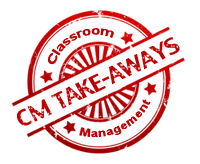
The bounce is used to give the student a break from pressure, not a chance for interaction. Positive interaction spoils the integrity of the intervention and encourages future misbehavior. Students should have been pre-taught the expectations for the environment to which they are moving and should be adequately supervised in that environment. Used only with great caution, antiseptic bouncing is sometimes the perfect way to help a kid “let off some steam.”
Timing is everything. And so is an understanding of the emotional state of students who are challenging your authority. When I say timing is everything I mean early intervention is critical. I teach a powerful strategy that relies on the contingent withdrawal of attention from a student exhibiting emergent (low level) misbehavior. It is a POWERFUL response to shutting down problem behavior.
It’s also a powerful refinement of a century old strategy, which affects powerful, dramatic, and positive impact on the contemporary classroom. It is unique in that in addition to allowing for the contingent withdrawal of attention, the basic principles of academic remediation are incorporated into the process, where the teacher stops the student, re-teaches, checks for understanding, and sends the student back to work independently.
Students are given a prompt, allowed to self-correct, and then asked to identify the interfering behavior – all while never leaving an academic environment.
Classroom Management Benefits for Teachers
- Teachers will learn how to keep a keen and calm mental set for classroom management. They will learn how to “read the room” and swiftly, positively, and gracefully nullify challenges and see and take the right course of action when challenged, while appearing “confident and comforting” to their pupils.
- Teachers will learn how to properly arrange and design the classroom environment. They will learn the “Teaching Power Position” and understand where you should and should not be, and how to eliminate positions in the classroom where students will successfully challenge them, as well as learn how to keep their students visually focused on top classroom priorities.
- Teachers will learn how to teach-to and enforce rules and procedures and transform “unsocialized” kids into top classroom performers, and teach students how to peacefully coexist in their classroom.
- Teachers will learn how to firmly but fairly carry out disciplinary actions. They will learn how to stop letting minor and major challenges overrun important teaching time, start teaching every student with confidence and success, stop letting minor discipline issues side-track important lessons and handle nearly any classroom situation that arises.

